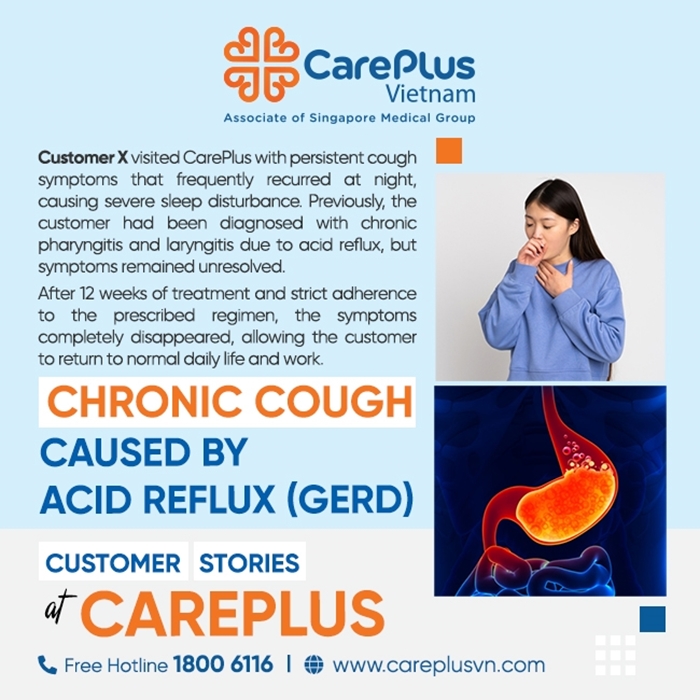PERSISTENT COUGH – CAUSE: GASTROESOPHAGEAL REFLUX DISEASE (GERD)

10/1/2025 10:27:29 AM
Ms. X. came to CarePlus after a long period of recurrent coughing episodes. Sometimes dry, sometimes with phlegm, her cough was especially severe at night, leading to insomnia, fatigue, and a significant impact on her work and daily life.
Previously, she had visited several medical facilities and received different diagnoses such as chronic pharyngitis, laryngopharyngitis, and gastroesophageal reflux disease (GERD). However, the symptoms only partially improved and never resolved completely.
CLINICAL ASSESSMENT – IMAGING: CLOSE COORDINATION FOR AN ACCURATE DIAGNOSIS
At CarePlus, a gastroenterology specialist examined her and recommended an upper gastrointestinal endoscopy to confirm the diagnosis, while also conducting tests to rule out other serious conditions that can cause chronic cough.
Results confirmed that GERD was the main cause. Based on this, the doctor prescribed a 12-week treatment plan combining specific medication with lifestyle adjustments. After consistent adherence to the regimen, Ms. X. was completely free of cough symptoms. Her sleep and overall health improved significantly, allowing her to return to a joyful and confident daily routine.
PERSISTENT COUGH – WHEN TO PAY ATTENTION?
Coughing is a natural reflex that helps clear the airway, remove irritants, prevent blockages, limit the spread of infection, and signal potential disease. However, if a cough persists for weeks without relief, it may indicate underlying conditions that require medical attention:
🔹 Respiratory causes:
- Respiratory infections
- Asthma
- COPD
- Tuberculosis
- Lung cancer
🔹 Non-respiratory causes:
- Gastroesophageal reflux disease (GERD)
- Medications: ACE inhibitors (e.g., Captopril, Enalapril) may cause persistent dry cough
🔹 Ear–nose–throat causes:
- Sinusitis, allergic rhinitis, chronic rhinitis (postnasal drip irritating the throat)
- Foreign bodies in the airway (especially in children)
🔹 Other causes:
- Environmental pollution or irritants
- Cardiovascular disease: heart failure
- Psychological or habitual factors
HOW DOES GERD-RELATED COUGH PRESENT?
Possible signs of GERD-related cough include:
🔸 Persistent dry cough, little or no response to cough medicine
🔸 Worse at night, after large meals, or after alcohol, coffee, carbonated drinks, and fatty foods
🔸 Burning sensation behind the breastbone (heartburn), sour regurgitation, bad breath
🔸 Morning hoarseness, sensation of a lump in the throat
🔸 No signs of respiratory infection such as fever or purulent phlegm
That’s why, with chronic cough, it’s important to see a doctor for basic investigations such as chest X-ray or ENT examination to rule out serious disease before confirming GERD.
LIFESTYLE MEASURES TO SUPPORT GERD-RELATED COUGH TREATMENT
🔹 Diet:
- Eat smaller, more frequent meals; avoid overeating
- Limit spicy, sour foods, chocolate, carbonated drinks, coffee, alcohol
- Avoid lying down for at least 2–3 hours after meals
- Do not eat late at night
🔹 Sleeping position:
- Elevate the head of the bed 15–20 cm or use an anti-reflux pillow
- Avoid tight clothing around the waist/abdomen
- Sleeping on the left side may help reduce symptoms compared to the right side
🔹 Lifestyle habits:
- Lose weight if overweight
- Quit smoking, reduce alcohol intake
- Exercise regularly, but avoid activities that increase abdominal pressure right after meals
- Manage stress effectively
🔹 Medical treatment:
Adhering to prescribed medication, attending regular follow-ups, and maintaining open communication with your doctor are crucial to achieving optimal treatment results.
CAREPLUS – YOUR PARTNER IN HEALTHCARE
Ms. X’s case highlights the effectiveness of close collaboration between patient and doctor. With a team of experienced specialists and advanced endoscopy and laboratory facilities, CarePlus is committed to accurate diagnosis and personalized treatment plans, helping patients quickly regain their quality of life.
💌 Don’t let persistent cough compromise your health and daily life. Seek early medical evaluation to ensure timely screening, diagnosis, and treatment.